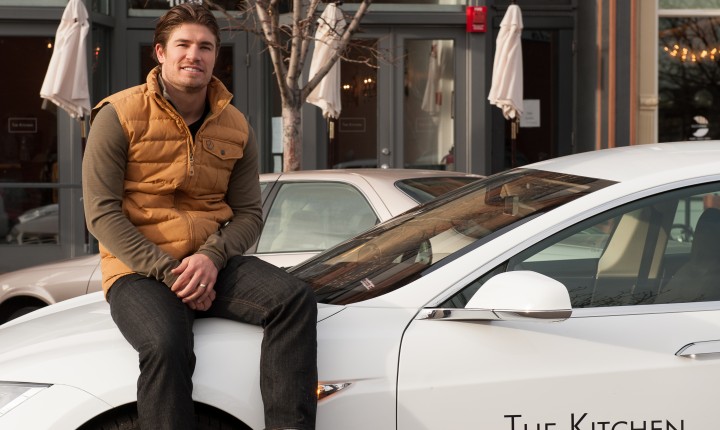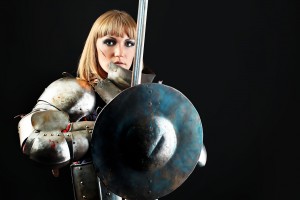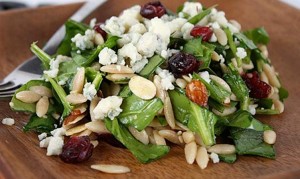Justin is in front of The Kitchen restaurant in Boulder, Colorado accompanied by a Tesla car. The Kitchen supports local farmers and organic local foods. The Tesla represents Justin’s interest in innovative technology and the drive to create a zero-emissions automobile, effectively moving away from fossil fuel dependence.
Justin Sandy, a retired NFL player, is now a purpose-driven entrepreneur. Following his days with the Tennessee Titans and Cleveland Browns, he is now involved in several businesses. One of which is, JIT Consulting, LLC. Sandy also has a strong interest in agriculture and is certified in Advanced Permaculture Design, in which he plays an active role with non-profit organizations to create a better world by developing agricultural ecosystems intended to be sustainable, regenerative, and self-sufficient. He currently is single and resides in Boulder, Colorado.

MG- You have been out of the NFL since 2008. Please tell us about your life, post NFL.
JS- After leaving the NFL due to a knee injury, I wasn’t getting any phone calls from teams, so it was time to move on—which was not an easy thing to do. A lot of retired professional sports players have an identity crisis; I wasn’t immune to that. I’m originally from northwest Iowa and went back home, then decided that I needed to do a solo trip. I flew to Costa Rica and didn’t speak a lick of Spanish. I ended up going to the coast, having an incredible time with zero plans whatsoever, and meeting some of the most fascinating and inspiring people. I was going through an identity crisis and this allowed me to get out of that box and find out who I was because football had defined me. It was the main driver of my life.
I decided that if I’m going to dedicate my time to anything else, it must have a positive effect on the people around me. I connected with some former teammates in Iowa and began working with an organic clothing company and giving speeches for the USDA in attempt to get healthy foods into elementary schools. I realized there needed to be more done than what the USDA was capable of. My realization was that we need to create more of this food and support people growing this food—the small, local, organic farmers. I traveled to Colorado to learn more about organic nutrient-dense food production and met a friend of mine who introduced me to the concept of permaculture, a design system based on producing sustainable, regenerative, and self-sufficient landscapes for human living.I decided that if I’m going to dedicate my time to anything else, it must have a positive effect on the people around me.
MG- You always had a plan for what came next as you attended Harvard and the Kellogg School of Management at Northwestern to study business. What enabled you to think so far in advance?
JS– I was only in college for three and a half years and left after my senior season to train in Atlanta. I didn’t have my degree so after my second season with the Titans, I went to Middle Tennessee State, trained during the off-season and went to school, then transferred all those credits back to University of Northern Iowa. I had broken both my feet so with the reality of my body not holding up to the NFL punishment for a long period of time, that seed was planted. I knew that I needed to start preparing myself for life outside of football. The NFL was offering opportunities through Harvard and Kellogg, so I took advantage of that.
MG- You have several businesses now related to entrepreneurs and nutrition. What is your business philosophy?
JS– I don’t necessarily think of myself as building businesses. I think of it as aligning myself with movements that I want to support because I think they are doing good things in the world—things that are needed and that I would use myself. I want those things to flourish and grow because I want to see the world a better place. I was always the underdog growing up. Undrafted, I didn’t get a scholarship to bigger schools coming out of high school. The one thing that stuck with me is the people you see on the way up are the same people you see on the way down.
The one thing that stuck with me is the people you see on the way up are the same people you see on the way down.
MG- Is the goal to make sure your businesses help you and clients find potential in all areas of life, including family, community, business, spiritual, and personal growth?
JS– I try to do my best to live in alignment with my values. I think that if everyone could live more like that, we would live in a better place. I believe people are inherently good at their core so I want to try to support other organizations and businesses.
MG- You said you’re now living a life with intentional purpose and you are living your values. What are those values and how do you fulfill them each day?
 JS– I think our values are different, depending on where we come from and what culture we are born into. At end of the day, if you’re someone who puts others above yourself and you’re happy about taking care of others more than your own needs, I think that’s the ultimate value and that supersedes anything. Otherwise, I would say trustworthy, authentic…at the core of it. It’s the Golden Rule. That’s a simple thing to say, but I don’t think anybody ever has or ever will achieve perfection when it comes to that value. It’s unattainable—that’s how I know it’s a good goal. While you strive for it, it makes you a better father, husband, or brother.
JS– I think our values are different, depending on where we come from and what culture we are born into. At end of the day, if you’re someone who puts others above yourself and you’re happy about taking care of others more than your own needs, I think that’s the ultimate value and that supersedes anything. Otherwise, I would say trustworthy, authentic…at the core of it. It’s the Golden Rule. That’s a simple thing to say, but I don’t think anybody ever has or ever will achieve perfection when it comes to that value. It’s unattainable—that’s how I know it’s a good goal. While you strive for it, it makes you a better father, husband, or brother.
MG- You’ve said it takes work living your best life and fulfilling your potential. What would you say to other men who may not have or are uncomfortable with the self-awareness that being a modern gladiator requires?
JS– I believe I can learn from every single person that I meet, so I never want to be on a platform that I have something more important to say or my opinions or values are better than anyone else’s.
I loved my experience in the NFL—to be disciplined and achieve my goal—but at the end of the day, I was an entertainer. Entertainment is sports, so I put that in its place as something now to create more positive change. A lot of my friends can talk in a Utopian way about how the world should be peace and love and happiness. We need to come to terms with the world that we’re living in right now, though—that doesn’t mean we can’t create small positive changes every day from the bottom up in a more organic way. To me, that comes down to intentional living, and that’s what I try to accomplish with my life and the businesses I support.
MG- What was it that intrigued you about Modern Gladiator to the point that you wanted to be a part of our mission to make men better individuals?
JS– I learned from early on in my life the power of a team. It is still powerful today because I am constantly striving to be the best version of myself. Yet, I am realistic and I know my naturally imperfect human self cannot do it alone. To get closer to accomplishing my goal, I know I need to surround myself with people who have similar values to mine. This team of people provides me with additional support, encouragement, and accountability.
 People who are intentional, open-minded about who they want to be, purposeful about the life they want to create, and courageous enough to take action to make those concepts a reality are the type of people I want to surround myself with—because by them attempting to live the best versions of themselves, it inspires me do the same.
People who are intentional, open-minded about who they want to be, purposeful about the life they want to create, and courageous enough to take action to make those concepts a reality are the type of people I want to surround myself with—because by them attempting to live the best versions of themselves, it inspires me do the same.
I have a lot of room for improvement, but I believe the more we take time to identify what is truly important to each one of us, and if we make the courageous leap to bring those values to our businesses—i.e., where we shop, the food we eat, the types of relationships we foster, what we watch and read—the better off we are all going to be. At our core, I believe human beings are inherently good.
I feel like Modern Gladiator represents that sense of support, encouragement, and accountability that many of us need to be the best version of ourselves, the primary example being me.
We need to come to terms with the world that we’re living in right now, though—that doesn’t mean we can’t create small positive changes every day from the bottom up in a more organic way.
Related Posts
« Spinach-Orzo Salad with Toasted Pine Nuts and Dried Cherries Go Big with Art in Small Spaces »









